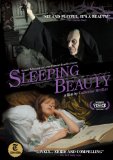| Reviews & Columns |
|
Reviews DVD TV on DVD Blu-ray 4K UHD International DVDs In Theaters Reviews by Studio Video Games Features Collector Series DVDs Easter Egg Database Interviews DVD Talk Radio Feature Articles Columns Anime Talk DVD Savant Horror DVDs The M.O.D. Squad Art House HD Talk Silent DVD
|
DVD Talk Forum |
|
|
| Resources |
|
DVD Price Search Customer Service #'s RCE Info Links |
|
Columns
|
|
|
Sleeping Beauty, The
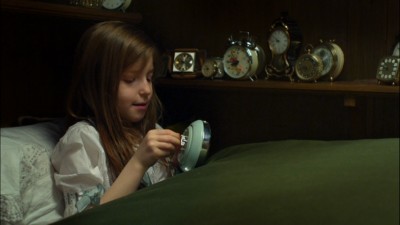
In French director Catherine Breillat's most extreme, disturbing film, 2004's Anatomy of Hell, there is a brief flashback scene that offers a sort of presentiment of her current obsession with the cinematic retelling of fairy tales (2010's Bluebeard and, now, The Sleeping Beauty). In this flashback--all bright, open nature and sunshine contrasting with yet connected to the rest of Anatomy of Hell's stark, graphic sexual explorations--the little boy who will become the male half of the film's (very) adult couple smashes a newly hatched baby bird, a traumatic sight that he forever after associates with the female sex organs. The powerful form and imagery of that scene--its heightened, gruesome yet transfixing, near-mythologically significant content; the dreamy, impossible beauty of its sunlit verdancy--resemble those of fairy tales, which nobody but the most naive could possibly believe are innocuous, not even the Disney versions. They are instead, of course, barely-sublimated expressions of desires and fears we don't want to think about children having, all extra-ripe for the most discomfitingly Freudian interpretations. Seen that way, the fairy tale quality is something that the sharp, intense mind of Breillat has actually brought to all of her work (each of her films could be considered a "fairy tale for adults"), and it is almost a self-evident move for her to give us her own Sleeping Beauty, the entirety of which revisits the pastoral yet disquieting atmosphere of that Anatomy of Hell reprieve and is a gorgeous, sometimes amazing, and strangely moving exploration and defamiliarization of one of our most well-known storybook tales.
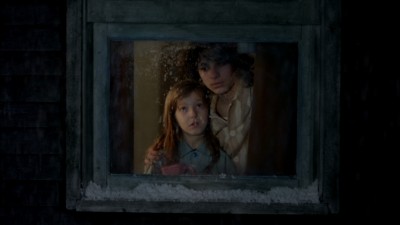
The film opens on the birth of the princess Anastasia (the princess being born to Russian royalty in this rendition) and her curse to an early death by an evil old fairy (Rosine Favey), with the belated intervention of three younger, more flighty fairy protectors, who reduce her death sentence to a mere accident at age six that will put her to sleep--and, a most important detail, allow her to dream--for 100 years. Cut to Anastasia, age six (Carla Besnaïnou); she's a tomboy who wants to be a knight instead of a girl stuck wearing dresses, and her inevitable accident comes when she too forcefully, physically resists being cast among other tutu-wearing girly-girls in a pageant. (The obligatory hand prick comes from a stick being used to hold her hair in perfect place.) After that, she embarks upon her 100-year sleep, and we follow along as, like Alice going down the rabbit hole, she advances into a dream world. A magical steam train is her first mode of transport, and it brings her to a cottage in the woods, where Anastasia is adopted by a tough but kind matriarch and her new older brother, Peter (Kérian Mayan), who becomes her beloved platonic playmate. This equal, mutually fulfilling relationship ends when Peter is tempted away, in some beautifully shot sequences (courtesy Denis Lenoir, who also shot Olivier Assayas's Carlos and works wonders here on digital video; the images are like illustrated plates from some deluxe antique children's book), by the Snow Queen (Romane Portail)--an idealized vision of coolly perfect, brittle femininity that appears to Peter, not coincidentally, as puberty overtakes him and begins to beckon him away from Anastasia.
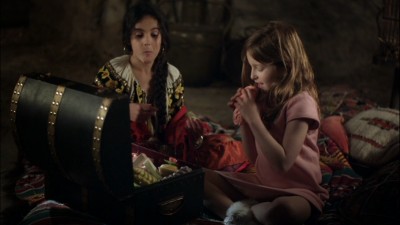
When Peter leaves her in pursuit of his ethereal queen, Anastasia is once again borne away by the dream train, embarking on a journey to find her beloved Peter wherever he has gone. She lands first in a kingdom run by little people and ruled by an albino-child king and queen, whom she befriends and who send her off in a carriage to a place where Peter may have been spotted. But the carriage is waylaid by bandits, and Anastasia is rescued by her fellow passenger, a gypsy and fellow tomboy (Luna Charpentier), who takes her into her frolicsome, celebratory, imagination-fueled world before sending her off once again to seek Peter, this time riding a doe and headed for snowy plains. There she meets an old woman, a magical crone, who directs her to a bush of forbidden berries where, she says, "she will find him." When Anastasia eats from this Tree of Knowledge, she is awakened in the present day as a 16-year-old (now played by the enchanting, Anne Wiazemsky-like Julie Artamonov) by a handsome "prince," a young man called Johan (David Chausse), who physically resembles an older Peter but who, unlike his predecessor, is all grown up and more than ready to leave the platonic behind (though it is actually the young-adult version of her gypsy girl (Rhizlaine El Cohen), who has remained a "tomboy," that appears to Anastasia one last time to initiate her into the delectations of physical love).
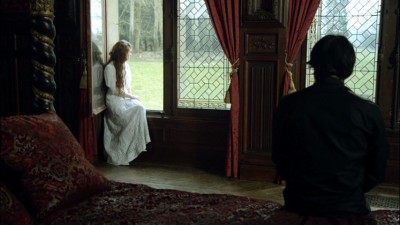
It is probably clear from that description that Breillat has not only very, very loosely adapted the original Charles Perrault tale for her Sleeping Beauty, but that she has also incorporated other bits of surrealism and myths/lore/legend--from the story of Adam and Eve to Hans Christian Andersen's Snow Queen to Gulliver's Travels--as well to put her own unmistakable stamp on the tale. Moreover, her take on the story's ending slyly inverts its traditionally presumed, rather sexist meaning. In this telling, the point at which Anastasia awakens introduces an accelerated narrative time, so that the post-awakening portion of the film feels like a 10-minute postscript to the sleeping beauty's adventurous dreams, with her waking from her sleep and her attempted idealization of the "prince" the disappointing end--and not the happily-ever-after beginning--of something wonderful. As in all of Breillat's films, being disabused of fuzzy-minded romantic notions like a rescuing prince is the single most vital step toward becoming an empowered, intelligent woman. That is, indeed, what her sleeping beauty becomes, but it is the sleeping part, rife with the freedom and possibility of dreams, that this film casts its indulgently luxuriant, wistful eye back upon. In Breillat's hands, "Sleeping Beauty" is revealed to be something it has never been before: a maddening and ravishing half-ode to, half-elegy for the part of ourselves that reconfigures and idealizes the world when we dream and dissipates, leaving us to the necessarily cold light of reality, when we wake up.
THE DVD:
The anamorphic widescreen transfer of The Sleeping Beauty is splendid, for the most part. Oddly for images originally created on DV, there are very rare scenes in which some flickering is noticeable; there also appears to be some aliasing on the film's end credits. However, these visual flaws are minute and do not go any significant way toward impeding the film's precise and clear visual beauty.
Sound:The Dolby Digital 2.0 surround soundtrack, in French with reasonably well-translated English subtitles, delivers not only the dialogue and the very infrequently deployed but effective classical-piano score, but also every rippling brook and footstep in the snow, with cleanly sparkling clarity.
Extras:Nothing but the film's U.S. theatrical trailer, which is nicely graphic-designed but fairly misleading, with rock music not present in the film used to make it look like something raucous, frenzied, and sexy rather than what it actually is: elegant, playful, and cerebral.
FINAL THOUGHTS:Not exactly a "fractured fairy tale" but one whose latent meanings are teased out and elaborated upon, Catherine Breillat's The Sleeping Beauty is a lovingly, meticulously staged bit of sensuous surrealism and sly commentary on gender roles, sexuality, and the ambivalent-at-best process of growing up. Breillat's version of the well-known heroine is much more proactive than usual, even (and especially) when sleeping; and her real awakening does not come at the kiss of a perfect prince (or even the much-more-than-a-kiss that, this being a Breillat film, we bear analytically-observant witness to), but with the realization that such a concept is a dangerously treacherous one that is bound to lead to disappointment and dependency. For this girl, the prince's kiss might be nice, but her real fairy-tale fantasy ending will only come true when she can once again become something like what she was able to be while she was asleep and freely, happily dreaming. Highly Recommended.
|
| Popular Reviews |
| Sponsored Links |
|
|
| Sponsored Links |
|
|
| Release List | Reviews | Shop | Newsletter | Forum | DVD Giveaways | Blu-Ray | Advertise |
|
Copyright 2024 DVDTalk.com All Rights Reserved. Legal Info, Privacy Policy, Terms of Use,
Manage Preferences,
Your Privacy Choices | |||||||









